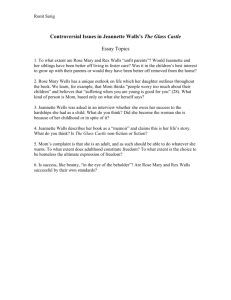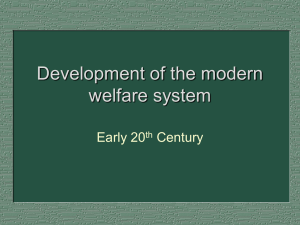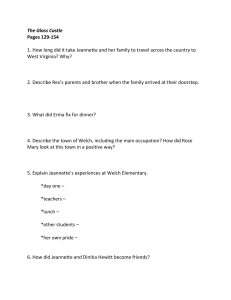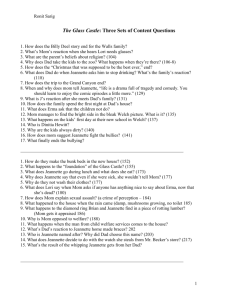The Glass Castle: Discussion topics
advertisement
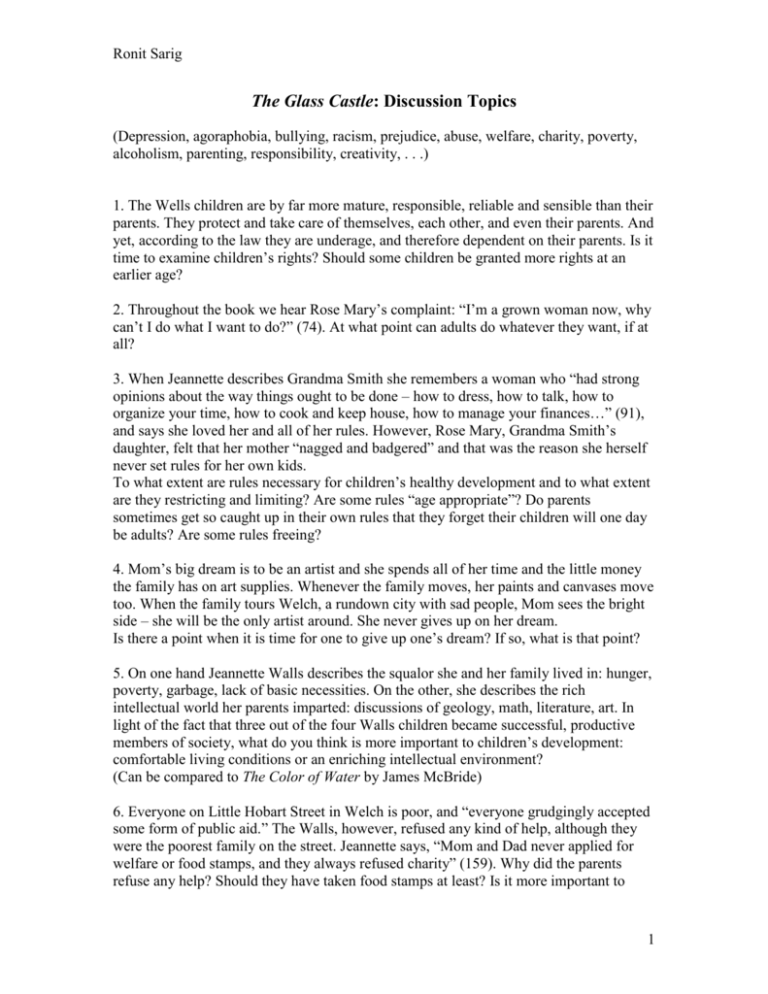
Ronit Sarig The Glass Castle: Discussion Topics (Depression, agoraphobia, bullying, racism, prejudice, abuse, welfare, charity, poverty, alcoholism, parenting, responsibility, creativity, . . .) 1. The Wells children are by far more mature, responsible, reliable and sensible than their parents. They protect and take care of themselves, each other, and even their parents. And yet, according to the law they are underage, and therefore dependent on their parents. Is it time to examine children’s rights? Should some children be granted more rights at an earlier age? 2. Throughout the book we hear Rose Mary’s complaint: “I’m a grown woman now, why can’t I do what I want to do?” (74). At what point can adults do whatever they want, if at all? 3. When Jeannette describes Grandma Smith she remembers a woman who “had strong opinions about the way things ought to be done – how to dress, how to talk, how to organize your time, how to cook and keep house, how to manage your finances…” (91), and says she loved her and all of her rules. However, Rose Mary, Grandma Smith’s daughter, felt that her mother “nagged and badgered” and that was the reason she herself never set rules for her own kids. To what extent are rules necessary for children’s healthy development and to what extent are they restricting and limiting? Are some rules “age appropriate”? Do parents sometimes get so caught up in their own rules that they forget their children will one day be adults? Are some rules freeing? 4. Mom’s big dream is to be an artist and she spends all of her time and the little money the family has on art supplies. Whenever the family moves, her paints and canvases move too. When the family tours Welch, a rundown city with sad people, Mom sees the bright side – she will be the only artist around. She never gives up on her dream. Is there a point when it is time for one to give up one’s dream? If so, what is that point? 5. On one hand Jeannette Walls describes the squalor she and her family lived in: hunger, poverty, garbage, lack of basic necessities. On the other, she describes the rich intellectual world her parents imparted: discussions of geology, math, literature, art. In light of the fact that three out of the four Walls children became successful, productive members of society, what do you think is more important to children’s development: comfortable living conditions or an enriching intellectual environment? (Can be compared to The Color of Water by James McBride) 6. Everyone on Little Hobart Street in Welch is poor, and “everyone grudgingly accepted some form of public aid.” The Walls, however, refused any kind of help, although they were the poorest family on the street. Jeannette says, “Mom and Dad never applied for welfare or food stamps, and they always refused charity” (159). Why did the parents refuse any help? Should they have taken food stamps at least? Is it more important to 1 Ronit Sarig have pride or have food? Did the refusal of food stamps and charity contribute to the children’s ultimate independence and self motivation? 7. Mom says that welfare “would cause irreparable psychological damage” to the kids. “Once you go on welfare, it changes you. Even if you get off welfare, you never escape the stigma that you were a charity case. You’re scarred for life” (188). What does Mom mean when she says, “you’re scarred for life”? 2
